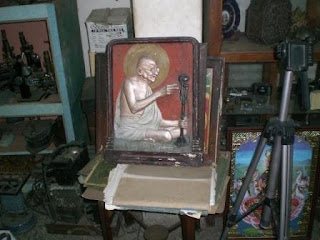Re-reading GK Chesterton’s Father Brown mysteries, it is incredible how little like genuine detective stories and how much like Roman Catholic fan fiction they sometimes seem like. The rationalist who kills a wealthy man who is planning to donate millions to the Roman Catholic church, instead of a dozen frivolous, trendy cults that pose no real challenge to rationalism, the daring crook who is brought to repentance by the humble priest who speaks to him of his soul. And the priest himself, Father Brown, who, despite all his bumbling and apparent harmlessness, possesses a shrewd understanding and deep knowledge of the ways of human wickedness – it’s all so much manipulation. Taking refuge in fiction and characterization, Chesterton places a number of time-bombs in his stories, stuff that might manipulate a vulnerable mind towards the Catholic creed, and away from doubt. Things like this remarkable statement by Father Brown:
"Sleep!" cried Father Brown. "Sleep. We have come to the end
of the ways. Do you know what sleep is? Do you know that every
man who sleeps believes in God? It is a sacrament; for it is an
act of faith and it is a food."
What, if anything does that even mean? By creating a false identification between faith and a natural physiological process common to humans and animals alike, Chesterton is attempting to make the believer, or wannabe- believer, liken the lowering of guard to find refreshment involved in falling asleep to the similar lowering of pride to accept spiritual reinforcement associated with the sacraments of his church. I call bullshit. Sleep is just a fact of life like farting and sweating, and only sacred in the sense that everything in creation is sacred to the true believer, which is circular reasoning at best.
GK doesn’t resist the easy canard of the apologist either, the old accusation that the atheist point of view somehow makes the world empty and mechanistic:
A vast heave went over Flambeau's huge figure. "And now I
come to think of it," he cried, "why in the name of madness
shouldn't he be all right? What is it gets hold of a man on these
cursed cold mountains? I think it's the black, brainless
repetition; all these forests, and over all an ancient horror of
unconsciousness. It's like the dream of an atheist. Pine-trees
and more pine-trees and millions more pine-trees--"
Well, of course, the atheist’s universe is empty - empty of the sort of meaning a theist wants to find in it. That hardly means it has no room for wonder, diversity and even the secular magic of natural selection.
There is a certain sympathy with socialism in some of these stories, but it is with those aspects of socialism that are in tune with Christian ideals, and hence a sympathy that again glorifies the church that GK has this great hard-on for:
"I won't have you talking like that," cried the girl, who was
in a curious glow. "You've only talked like that since you became
a horrid what's-his-name. You know what I mean. What do you call
a man who wants to embrace the chimney-sweep?"
"A saint," said Father Brown.
"I think," said Sir Leopold, with a supercilious smile, "that
Ruby means a Socialist."
Ultimately, though, the only source of revelation in these stories is Father Brown, and, similarly, the only source of meaning in GK Chesterton’s world is the church. All his brilliance, style and wit cannot change the fact that he began each story with this pre-ordained conclusion in mind and went on to create a loaded game where his side could win each time without examining anything but a caricatured version of the other side.














